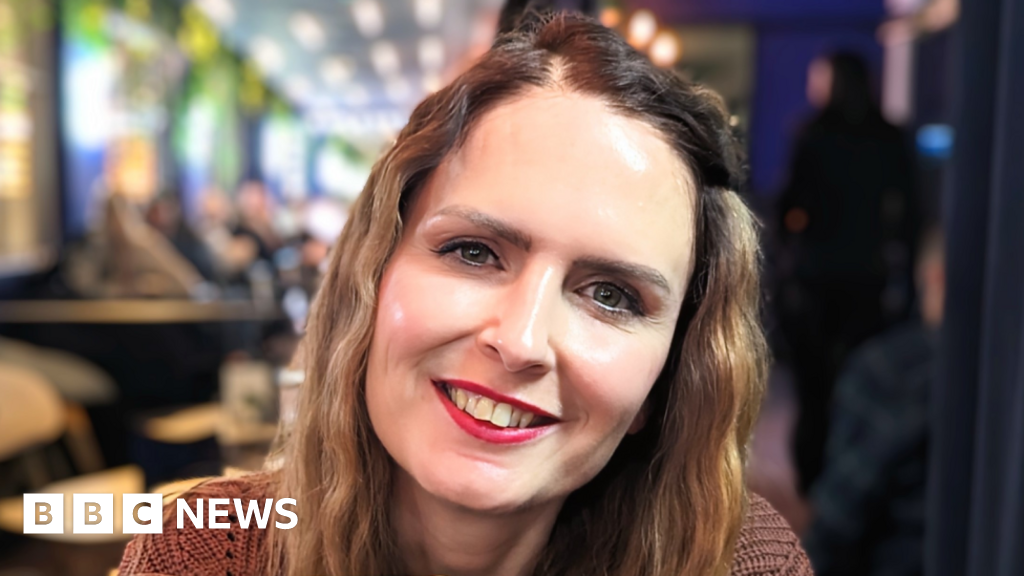Image source, Emma Williams Tully
A woman who went into chemical menopause at the age of 20 after having undiagnosed endometriosis said she doesn’t want anyone to go through what she went through.
Emma Williams-Tulley, 39, from Wrexham, started having very heavy periods when she was 10 years old.
Despite consulting various medical professionals “multiple times”, endometriosis was not mentioned for the next 10 years.
The Welsh Government has acknowledged that both endometriosis and menopause care in Wales needs improvement.
- author, Catriona Aitken
- role, BBC News
For Emma, the endometriosis diagnosis process took another 11 years, during which she was treated with chemical injections called Prostap to manage her symptoms.
“In terms of the pain and bleeding it was amazing, but the symptoms of menopause were hell on earth, both physically and mentally,” she said.
She suffered from depression, hair loss, fatigue, brain confusion and hot flashes.
“I didn’t feel like I was 20 anymore. I felt like an old woman.”
Endometriosis is a disease in which tissue similar to the lining of the uterus grows in other places, such as the ovaries and fallopian tubes.
Prostap suppresses ovarian function in women, stopping the production of estrogen, progesterone, and testosterone, which are the causes of endometriosis.
This is a temporary menopausal state and does not cure endometriosis, but is often used to test for endometriosis before undergoing invasive surgery.
But estrogen may also be needed for other things, such as a healthy heart, brain, and bones.
Women going through menopause may be offered treatments such as hormone replacement therapy (HRT), which restores estrogen to the body, either naturally or chemically.
However, because endometriosis feeds on estrogen, it can be difficult to address.
Emma said she was only offered “generic HRT” to reduce the side effects of Prostap, but was not told it could make her conditions worse, so she decided to stop taking it.
Because menopause is a common condition among older women, she said she felt isolated and unable to confide her experiences even to close friends.
“I felt very alone and very vulnerable.
“Everyone experiences menopause differently. What may be fine for some may be tough for others. So we’re breaking that taboo.”
When it started, she had just met her now-husband, Dan, and wanted to enjoy life like most people her age.
Image source, Emma Williams Tully
Emma said she was never told what Dr Prostap would be doing or asked if she was prepared to endure temporary menopause.
The injections relieved her symptoms, so endometriosis was suspected, but endoscopic surgery found no signs of it, and so a “vicious cycle” of surgery and prostaglandins began.
She only went off medication to try for a baby, which she said was “not easy” because of the “indescribable” pain.
“I was just trying to have a good time and it was awful. I was lucky enough to conceive naturally but as soon as I gave birth the symptoms came back.”
At the age of 31, Emma’s organs had sustained so much damage that she had to undergo a hysterectomy – an operation to remove her uterus.
However, part of the fallopian tube was mistakenly left behind, and the regeneration of the ovary was only discovered on an unrelated ultrasound scan.
She said her estrogen levels “soared” after the procedure, which she called a “mystery” and was not taken seriously.
“There’s so many misconceptions… It gives the impression that you’re always Googling things. I feel like if you don’t educate yourself, what’s the point?”
Emma now has an ileostomy, colitis, bladder problems and is awaiting removal of her colon and rectum.
“I wouldn’t wish that on anyone,” she said.
Catherine Gale, 50, a gynaecological nurse from Lampeter, Ceredigion, also has endometriosis and took a similar drug to Prostap called Zoladex when she was in her 30s.
When menopause began in her early 40s, she realized many women were ill-prepared to deal with it.
“I was on my knees. I was just so overwhelmed and exhausted,” she said.
She says one in 100 women under 40 will reach menopause.
“It’s really hard for women who go through it at a much younger age, when their friends are starting to think about having a family or they’re in college.”
“We need to talk more about the menopause,” she said, adding that there was a “lack of awareness” about the help available.
“I think we’re really letting women down when it comes to their health.”
Image source, Katherine Gale
“Postcode Lottery”
Sexual and reproductive health consultant Dr Michelle Olver leads the specialist menopause clinic within Annelin Bevan University Health Board and a private clinic covering South Wales.
She said it was difficult to balance the symptoms of endometriosis with the side effects of “hormonal withdrawal” and hormone replacement, and stressed that the health service was moving away from a “one-size-fits-all” approach, but acknowledged that access to help “depends on your postcode”.
Dr Olver also teaches menopause to medical students at Cardiff University, something that wasn’t available when she trained.
Image source, Emma Williams Tully
Emma is especially worried about the future of her nine-year-old daughter, Belle.
“I’m terrified,” she said.
“I don’t think my daughter really understands what mommy’s tummy troubles are, and I don’t want to scare her.”
She added: “Every day young people send me messages saying they have terrible problems and no one believes them.”
The Welsh Government said Health Secretary Elune Morgan had “made clear his determination to improve women’s health services” and that a 10-year women’s health plan for Wales was due to be published by the end of the year.
“We recognise there is room for improvement in menopause and endometriosis care, treatment and support and there is a need for greater consistency in these services across Wales,” the report said.


